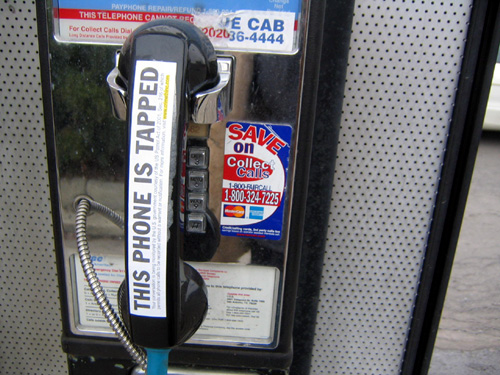I've previously mentioned several of his examples on NLT, but Mark Steyn sums up the absurd charade of "rights"-based oppression prevailing in Great Britain. It's shamefully ironic that George Bush was consistently denounced for rights-depleting policies by which (as in the "domestic spying program") not a single American can be located who was in any manner harmed in the slightest - yet Democrats merrily seek to silence conservative talk-radio and liberals would arrest pro-life prayer groups as organized crime syndicates without the slightest sense of contradiction or hypocrisy.I think the last bit of Paulette's claim here is either overstated or outright wrongheaded, but let's leave that alone for his second. I'm struck by his claim that we can't find a "single American" who was harmed by the domestic spying program.
Well of course we can't. We're not allowed to know who was spied upon! And thus we don't know who might've been harmed. Here's the ACLU's summary of the dismissal of its lawsuit against the program:
In July 2007, the Sixth Circuit Court of Appeals dismissed the case, ruling the plaintiffs in the case - which includes scholars, journalists, and national nonprofit organizations - had no standing to sue because they could not state with certainty that they have been wiretapped by the NSA.When a group came forward with proof it had been surveilled -- the evidence was accidentally given to them by government lawyers -- the government tried to invoke the State Secrets Act. If there was harm (both the Bush and Obama administrations argued) too bad: It couldn't be talked about in court. It would just have to be swept under the rug.
The decision "insulates the Bush administration's warrantless surveillance activities from judicial review and deprives Americans of any ability to challenge the illegal surveillance of their telephone calls and e-mails," said ACLU Legal Director Steve Shapiro. He added the ruling "did not uphold the legality of the government's warrantless surveillance activity. Indeed, the only judge to discuss the merits clearly and unequivocally declared that the warrantless surveillance was unlawful."
Because the appeals court refused to rule on the legality of the program, Americans were denied the chance to contest the warrantless surveillance of their telephone calls and e-mails.
I don't mind if Justin Paulette is concerned about political correctness swamping the rights to free speech; I even share some of his concerns. But his point is undermined by invoking an example where the absence of evidence a "single American" who was harmed by a government spying program might, in fact, be evidence of the government's overreach.


No comments:
Post a Comment